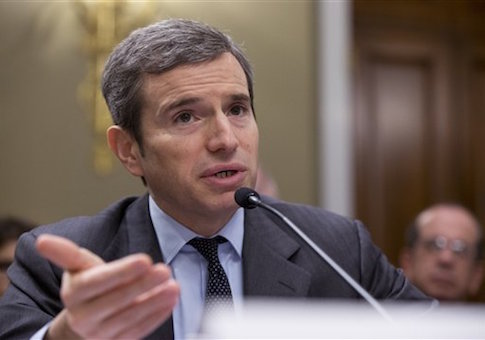A top adviser to the U.S. Treasury who has drawn the wrath of left-wing Democrats for his ties to Wall Street bought and sold as much as $150 million in securities during his first year in that post, financial disclosures show.
President Obama tapped former Lazard investment banker Antonio Weiss in 2014 to be undersecretary of the Treasury for domestic finance. However, a cadre of Senate Democrats led by liberal firebrand Elizabeth Warren (D., Mass.) scuttled his nomination.
Instead, Weiss was appointed as a Treasury Department counselor in January 2015. From his appointment through the end of last year, Weiss bought and sold between $43 million and $156 million in securities, a personal financial disclosure statement obtained by the Washington Free Beacon shows.
The disclosure lists 103 purchases and sales from March through December of 2015. Federal appointees are only required to disclose the range of an asset's value; the values of the funds bought and sold by Weiss last year ranged from $1,000 to $5 million. Some provide no upper estimate, simply stating their value at over $1 million.
Most of the trades involved index funds, which are generally considered safer and more passive investments and are typical of long-term portfolios in a retirement account, for instance. But Weiss also traded in private equity and pooled investment funds.
Weiss did not respond to questions about his activity in financial markets. The Treasury Department also did not respond to a request for comment.
According to an official who reviewed Weiss' financial disclosures, his trades were fully above board. "On the basis of information contained in this report, I conclude that the filer is in compliance with applicable laws and regulations," wrote Treasury attorney Elizabeth Horton.
However, former U.S. attorney Matthew Whittaker said that activity may have presented issues, even absent any violations of federal ethics rules that bar appointees from trading on information obtained through their official duties.
Those rules were beefed up by a 2012 law called the STOCK Act, which sought to address the widespread use by members of Congress and federal officials of financial information gleaned from their government duties in their personal financial activities.
Weiss "should explain how he makes certain not to use any non-public information that he is privy to in his official duties," said Whitaker, who leads the Foundation for Accountability and Civic Trust, a government ethics group, in a Tuesday email.
"The optics are not good and I would question how he is doing this while maintaining a full time job for the people. The market is usually open during normal business hours," Whitaker noted.
According to his official Treasury bio, Weiss "advises the Secretary on a broad range of domestic and international issues related to financial markets, regulatory reform, job creation, consumer finance, government lending practices, and broad-based economic growth."
Weiss' most notable role since joining Treasury was in leading negotiations over a $70 billion Puerto Rican debt relief bill that Congress approved this year.
His role as counselor came after Warren and a handful of left-wing Democratic Senators managed to sink his nomination in late 2014 for a more senior post at Treasury.
The spat pit factions of the Democratic Party against each other, with some criticizing Warren's apparent refusal to confirm any administration appointee with a Wall Street background.
Behind the scenes, leading Democrats had harsh words for Warren. "Such a piece of work," said John Podesta, then a top adviser to President Obama, in an email stolen by hackers believed to be acting in concert with the Russian government and released in November by Wikileaks.
Podesta, who went on to chair Hillary Clinton's presidential campaign, was discussing Weiss with Herb Sandler, a high-dollar Democratic donor and former banker blamed for the near-collapse of Wachovia in 2008. In emails to Podesta, Sandler called Warren "the prima donna."
Warren's office did not respond to a request for comment on Weiss' continued activity in financial markets.
